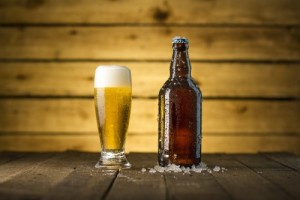
Filtered Water Brews Better Beer
By Dan DeBaunShare
Every bottle of beer, no matter where it was brewed or who brewed it, is made up largely of water. The type of water used in the brewing process therefore has a great influence of the flavor of the beer. Historically, beer brewers have used locally sourced water to brew beer, contributing to the distinct flavors of beers brewed in different regions around the world. Over the years, beer brewers have learned that managing the make-up and quality of the water they use in the beer brewing process can give their beers a distinctly unique flavor.
Water filters provide beer brewers with a clean slate from which they can add ingredients and tweak their recipes to create their perfect brew. Using filtered water allows brewers to establish a consistent flavor across various batches or to mimic the quality of water used in famous beer making regions on the other side of the world, giving them greater control over the flavor of their beer, as well as the ability to creatively experiment with different recipes.
The Role of Water in the Beer Brewing Process
Because beer consists of roughly 90% water, the composition and quality of water used in the beer making process will obviously greatly influence the beer's taste. The key elements that will influence the flavor of beer are mineral make-up, pH and alkalinity.
In the initial stages of the brewing process, crushed grains (typically barley) are steeped in hot water — a process known as mashing — until they form a thick mash. The hot water activates enzymes that break down the starch into sugars that are essential for the fermentation process. The fermentable liquid (wort) that forms consists of carbohydrates and proteins that will contribute to the malt, body and mouthfeel of the beer. When this mixture is ready for fermentation to begin, it consists of up to 90% water. Since boiling the wort mixture brings out the flavor and aroma from hops, water therefore plays an essential role in developing the flavor of the beer. Water, particularly the minerals in water, also facilitates enzyme activity, so essentially water is key to the whole beer brewing process.
What Can go Wrong?
Ions that can affect the flavor or fermentation process
There are several ions that can literally ruin water used to brew beer. Chlorine and chloramines are two chemical additives commonly used by water utilities to disinfect water during the treatment process. However, chlorine can ruin the taste of beer, making it taste like plastic. Chlorine can also react with ammonia to form chloramine, a byproduct of chlorine that not only ruins the flavor of beer, but also hinders the fermentation process.
Iron, a mineral that is commonly found in water, is another non-desirable in beer water, as it also negatively affects taste and fermentation at levels as low as 0.05mg/L water.
Manganese, often found together with ion, is another ion that will ruin the flavor of your beer as well as the fermentation process if present in concentrations high than 0.01 mg/L in water.
Nitrates and Nitrites can get into water from agricultural runoff or from wastewater effluent/septic tank pollution. These contaminants not only pose a serious health risk if ingested, but can also destroy the taste of the beer you are brewing.
What Affect Does pH Have on Brewing Beer?
The pH of water used in the brewing process will not only strongly affect the flavor of the beer, but it also plays a critical role in enzyme activity that is key to the fermentation process. Since both the enzymes and yeast prefer an acidic environment, a low pH provides optimal conditions for fermentation to take place. A high pH will give the beer a bland, astringent taste lacking a full robust flavor. A high pH can also encourage unwanted bacterial growth.
Since water typically tends to be alkaline or neutral rather than acidic, it may require a mineral additive, such as calcium, to make it more acidic. It is important to monitor the pH using a pH meter throughout the entire brewing process and to add additives to maintain the desired pH (pH of 5.2 - 5.5). Should the mixture be too alkaline, you can still save your beer by adding either lactic or phosphoric acid, or a commercially prepared buffering and/or stabilizing agent.
Which Water is Best for Brewing Beer?
Since the composition of water has such a huge influence on the flavor of the beer, the best water to use in the beer brewing process is essentially any water that gives the brewer complete control over the flavors that develop. If the water is rich in mineral or metals, it will limit the brewer's creativity significantly. Municipal water typically contains chlorine or it's byproducts, which will impart a chemical taste, and also negatively affect the fermentation process.
The best way to perfect the beer brewing process is to filter your water. This will give you a consistent blank slate, allowing you to fine-tune your craft to develop the flavor and outcome you desire on a consistent basis. It's far easier to develop a winning recipe with water that has had the unwanted chemicals and minerals removed, than to try and create something out of water that contains a whole suite of unwanted ingredients.
What is Best Water Filter for Beer Brewing?
There are many different water filter systems on the market. Some options include reverse osmosis, deionization, distillation and carbon filtration, all of which will vastly improve the quality of water used in the beer brewing process. The downside is that many of these filtration systems are prohibitively expensive, and out of reach of the average home-brewer; activated carbon filters being the exception.
Activated Carbon Water Filters
A good quality carbon water purifier, such as the Big Berkey range of water filter systems fitted with Black Berkey carbon filters, can remove chlorine and its by products, as well as a host of other contaminants that will not only ruin your beer, but potentially also your health.
Carbon filters use a process known as adsorption to absorb contaminants as the water passes through the filter. The activated carbon filters that are responsible for filtering out the contaminants contain tiny pores that vary in size (microns), which allow the water to pass through while the contaminants are trapped by the filter media. Because chlorine and chloramines are so widely used to treat water, and because they can both significantly impact the taste of beer, removing these common contaminants will automatically improve the flavor of your brew. Big Berkey filters are capable of removing chlorine to undetectable levels and reducing chloramine by more than 99.999%. They can also remove pesticides, pharmaceuticals and dangerous heavy metals such as lead that could otherwise have significant health impacts.
Carbon filters are very effective at removing foul tastes and odors from water, which will go a long way to improving the taste of your beer. However, they do not alter the mineral content of water significantly. If you are satisfied with the mineral composition of your water, then a carbon filter is highly recommended for improving the taste of the water used for the brewing process, and ultimately the flavor of your beer.
Investing in a good quality carbon filter capable of removing those unwanted contaminants that can ruin your brew may be all that you need to produce the world's best home-brewed beer.-
Regular price From $302.00 USDRegular priceUnit price / per
-
Regular price $234.00 USDRegular priceUnit price / per
-
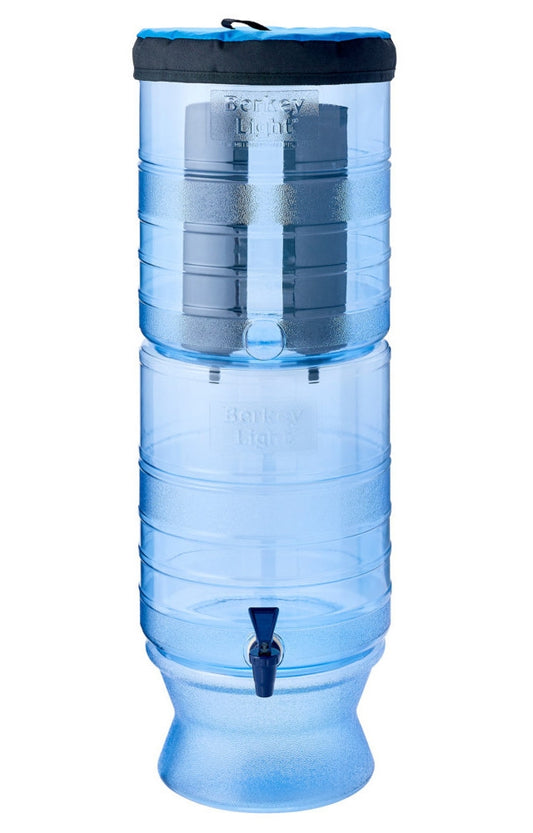
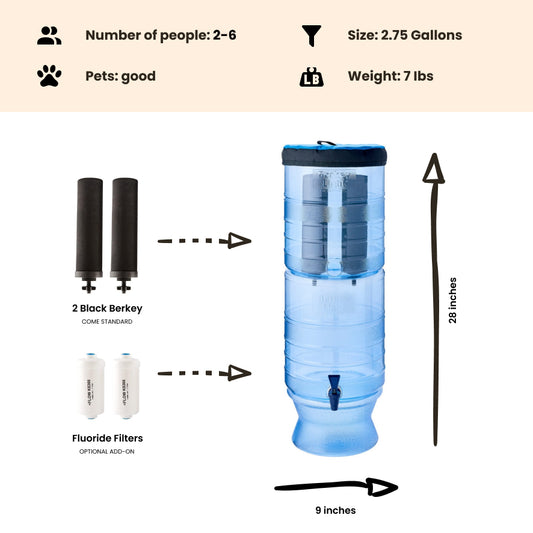 Sold outRegular price From $305.00 USDRegular priceUnit price / per
Sold outRegular price From $305.00 USDRegular priceUnit price / per -
Regular price $327.00 USDRegular priceUnit price / per
-

 Sold outRegular price From $367.00 USDRegular priceUnit price / per
Sold outRegular price From $367.00 USDRegular priceUnit price / per -
Regular price From $408.00 USDRegular priceUnit price / per
-
Regular price From $451.00 USDRegular priceUnit price / per

Dan DeBaun
Dan DeBaun is the owner and operator of Big Berkey Water Filters. Prior to Berkey, Dan was an asset manager for a major telecommunications company. He graduated from Rutgers with an undergraduate degree in industrial engineering, followed by an MBA in finance from Rutgers as well. Dan enjoys biohacking, exercising, meditation, beach life, and spending time with family and friends.
~ The Owner of Big Berkey Water Filters





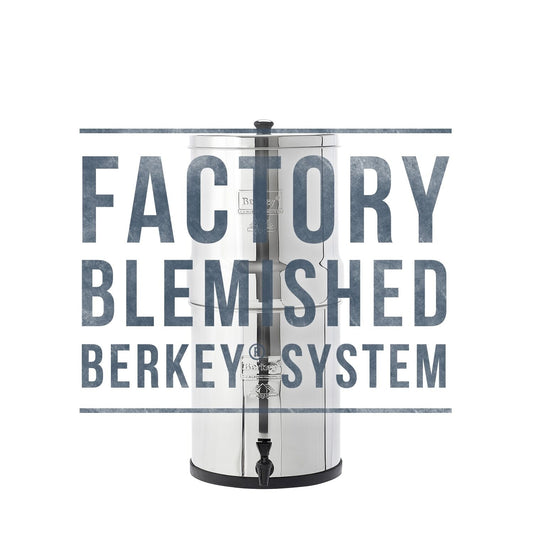
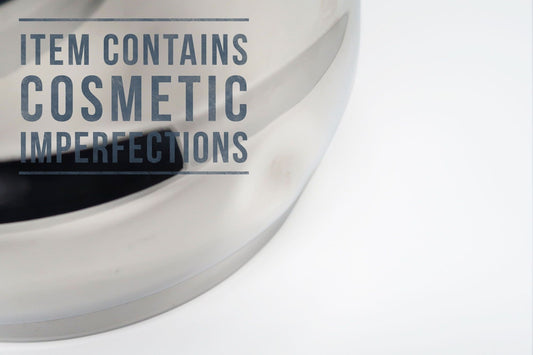








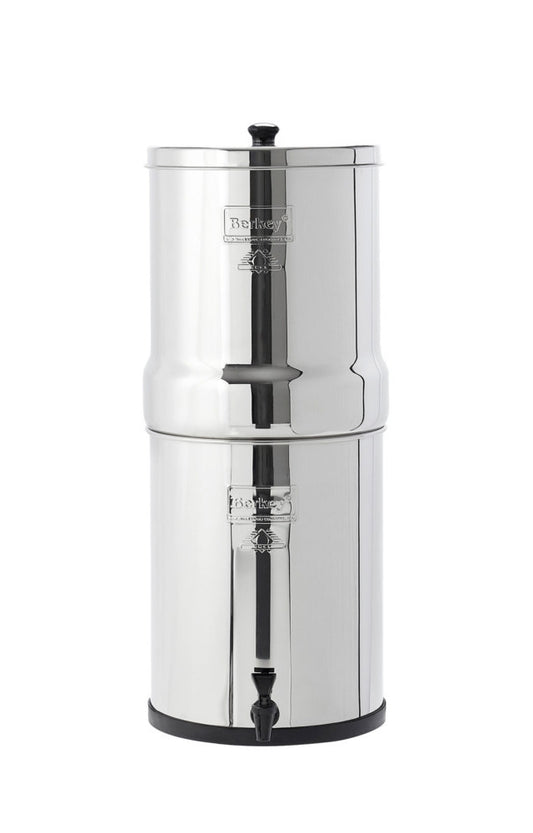
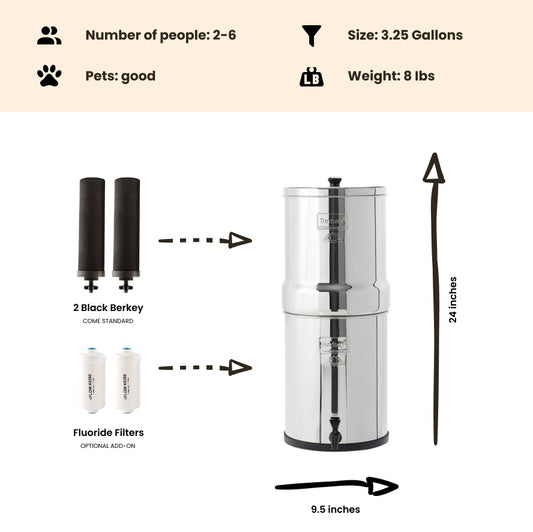



I enjoyed reading this post.
Very informative.
Thank you, it gives me a lot to think about